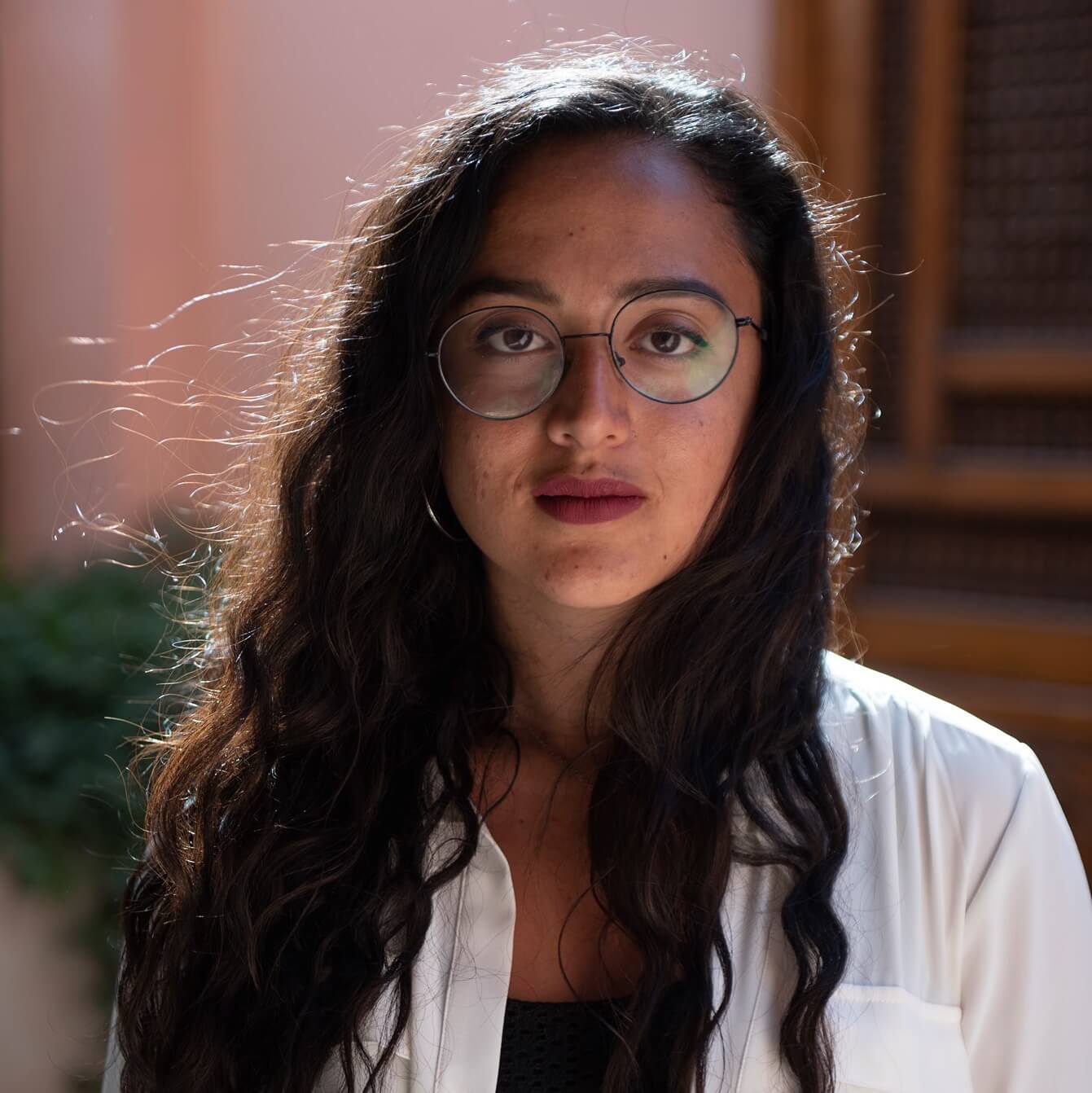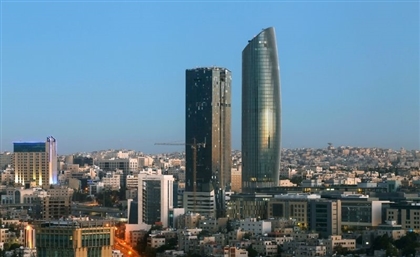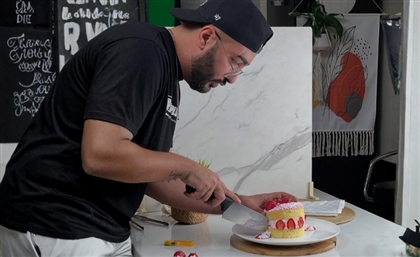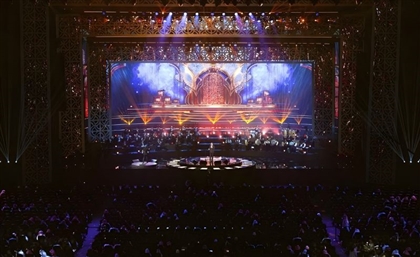AlRawabi School for Girls: The Pink Madness of Netflix’s Jordanian Hit
CairoScene contributing editor, Bahira Amin, takes a deep dive into the show turning the usual depictions of Arab women in media upside-down.
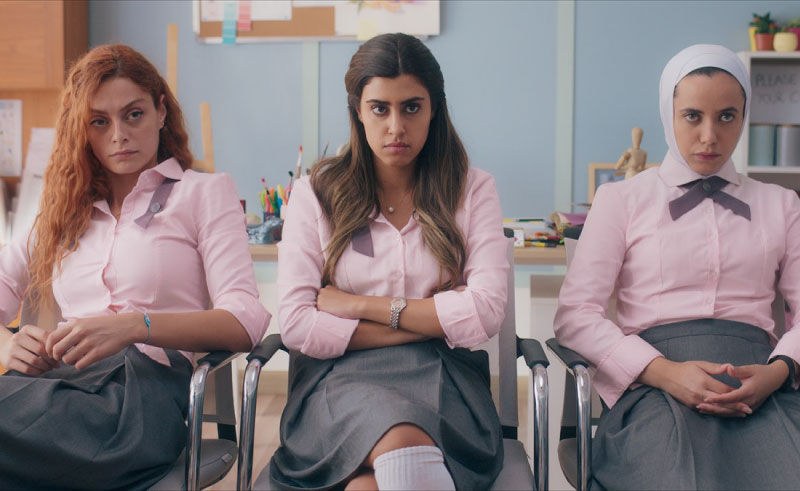
Everything is pink. The uniforms, the tiles, the bedroom décor, the title sequence. Netflix’s latest Arabic-language production, AlRawabi School for Girls, is a pastiche of gender performance, both imitating the reality of teenage girlhood in Jordan, and taking it to its darkest extreme. In a tight six episodes, creators Tima Shomali and Shirin Kamal create a vibrant, biting narrative of bullying, social media culture, patriarchal violence, and mental health.
The show, which was released on August 12th to social media’s celebration and ire, starts with what has become a formulaic Netflix setup: an act of violence has occurred, an interrogation is underway, a group of teenagers respond to an authority figure’s questions under dramatic lighting.
Very quickly, however, AlRawabi makes it clear it isn’t just an Arab version of things we’ve seen before. We immediately find out who beat up Mariam (played by Andria Tayeh) and left her bleeding in the dirt. Mariam proceeds to launch a revenge plan to take down the trio of popular girls: the Blair Waldorf-Regina George of our nightmares, Layan (Noor Taher); the sardonic number two, Rania (Joanna Arida); and the aggressive social climber Ruqqaya (Salsabiela).
From the very first episode, the texture of the show is unique, for obvious reasons: nearly everyone on screen is a woman. Male characters are few and far between, and only ever appear in relation to the women in the core cast (a boyfriend, a father, a brother). It’s a refreshing reversal of the status quo in Arab entertainment, and was intentionally reflected behind the camera as well, according to the show’s creators.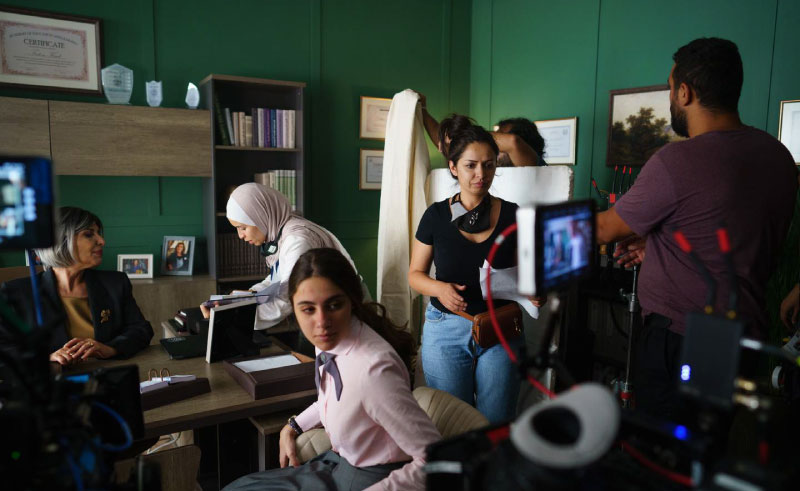 “Usually, female characters are portrayed from the perspective of how a man sees these women,” Shomali said in an interview with Arab News. “The difference in this show is that it’s written by a woman, from the eyes of a woman, telling stories of young women. And in each department - from cinematography to production design, from character to costumes - each one of these women (brought) her own touch to it, to tell the story of these young women.”
“Usually, female characters are portrayed from the perspective of how a man sees these women,” Shomali said in an interview with Arab News. “The difference in this show is that it’s written by a woman, from the eyes of a woman, telling stories of young women. And in each department - from cinematography to production design, from character to costumes - each one of these women (brought) her own touch to it, to tell the story of these young women.”
The girls aren’t figments of male imaginations, they’re real: in turn sympathetic and messy, principled and confused, bullies and victims. As Mariam teams up with new girl Noaf (Rakeen Saad) and best friend Dina (Yara Mustafa) to exact revenge on her aggressors, the line between right and wrong becomes a jump rope, and everyone’s playing double-dutch.
Overall, it’s a refreshing, entertaining, intense watch, though it does have a tendency to veer into the implausible. At a prestigious Jordanian school in 2021, for example, with students who decorate their rooms with ‘the future is female’ stickers and feminist paraphernalia, it’s hard to believe the whole school is making fun of a girl for a period stain, or bullying another for having anxiety. It’s 2021. We all have anxiety, and every Arab teenager is posting about it on TikTok.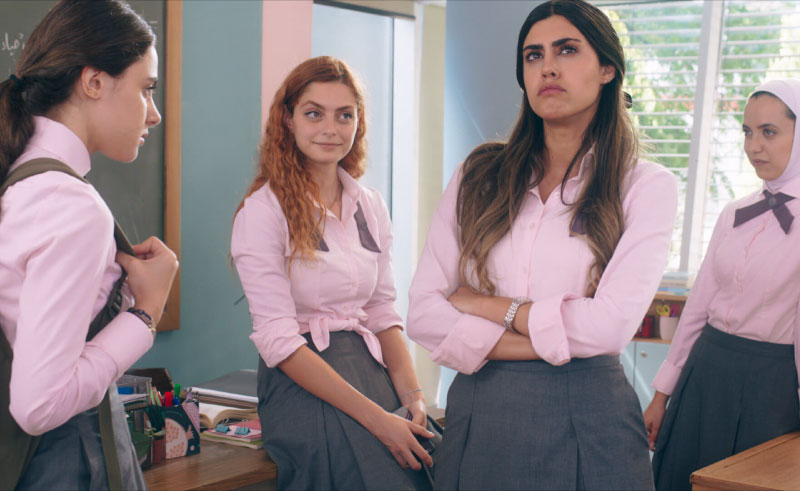 By and large, the actresses’ performance is strong, if a little uneven at times. The core cast is impressive, considering it’s the debut performance for most of them. Andria Tayeh’s portrayal of Mariam’s descent into obsession has me itching to both yell at and hug her. Noor Taher brings Layan’s evil to life from an authentic (if inherently flawed) place, tempering her nastiness with something human. Joanna Arida as Rania is bewitching to watch, charismatic even when her jokes fall a little flat. She winks flashes of empathy at the audience and rounds out her character beyond the trope of the sarcastic sneering sidekick. The youngest of the core cast, Yara Mustafa’s K-pop loving Dina is bubbly, nervous, and familiar.
By and large, the actresses’ performance is strong, if a little uneven at times. The core cast is impressive, considering it’s the debut performance for most of them. Andria Tayeh’s portrayal of Mariam’s descent into obsession has me itching to both yell at and hug her. Noor Taher brings Layan’s evil to life from an authentic (if inherently flawed) place, tempering her nastiness with something human. Joanna Arida as Rania is bewitching to watch, charismatic even when her jokes fall a little flat. She winks flashes of empathy at the audience and rounds out her character beyond the trope of the sarcastic sneering sidekick. The youngest of the core cast, Yara Mustafa’s K-pop loving Dina is bubbly, nervous, and familiar.
Noaf, the alternative new girl, is a standout. With her signature choker, black-on-black outfit, blunt bangs, and ‘screw you’ attitude, she’s a compelling character authentically portrayed. Rakeen Saad, a veteran in comparison to her cast-mates at a difficult-to-believe 31 years old, is a grounded performer, using her body to express subtleties that carry the emotional weight of whole scenes. She creates a character that’s young and scared, with a strong moral compass but who’s still never faultless. Whether she’s crying through the streets of Amman or terrified in the show’s most difficult scene to watch, Saad fills her performance with a captivating dynamism.
Overall, even with a few issues and inconsistencies, the show is a must-watch. It’s a strong indication of where the future of Arabic-language Netflix is heading, as the streaming giant gears up for more and more focus on the region.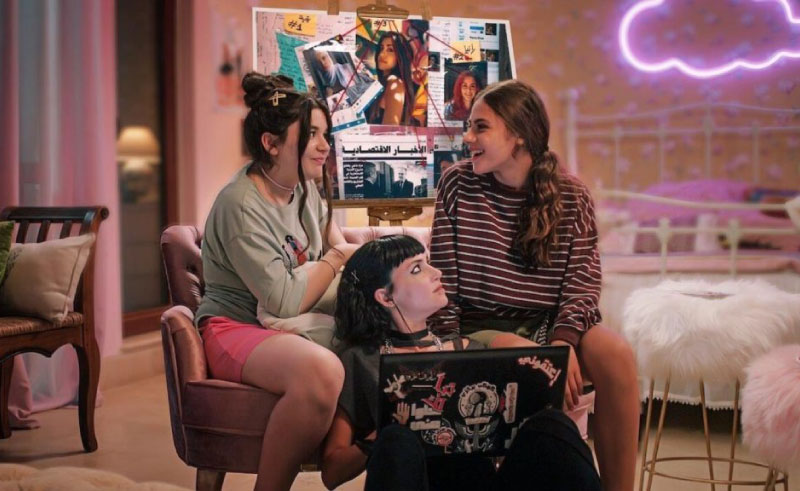 Major spoilers ahead. Stop here if you’d like to watch the show spoiler-free, or read on for our discussion of the plot.
Major spoilers ahead. Stop here if you’d like to watch the show spoiler-free, or read on for our discussion of the plot.
The further along we get into Mariam’s plan, the more it feels like we’re watching her descent into obsession. Again and again – at times so heavy handedly it feels like spoon-feeding the ending – Mariam is warned that she’s going too far.
But she’s already too far gone. Every time she could have turned back, she’s pushed over the edge by Layan’s ceaseless evil. In the fourth episode, Mariam seems to be coming to her senses before the bully steals her journal, makes a million copies, and pastes them all over the school.
It’s also this episode that has to reckon with an important question: is Layan believable as a villain? Does this brand of bullying make sense for a show set in a prestigious Jordanian high school in 2021? Not really. A lot of the popular girls’ techniques, as well as the entire school’s blind support of them, often feel dated. When Mariam is tapped to tutor Noaf, Ruqqaya goes with a move that was awkward even in the 2000s American high school movie it was ripped out of: the old “*cough* nerd *cough*.”
In this era of social media wokeness, the worst bullies aren’t the pre-Glee megalomaniacs smacking books out of your hands and calling you a gay nerd. The worst of the worst are the narcissists that deploy the trendy language of feminism, mental health awareness, and inclusivity to veil their sadism. Instead of a cringeworthy chorus of girls chanting ‘majnouneh’ (crazy), at a cowering Mariam who has been outed for taking anti-anxiety pills, it would have been deliciously bone-chilling to watch Layan drop #girlboss platitudes in her torture campaigns.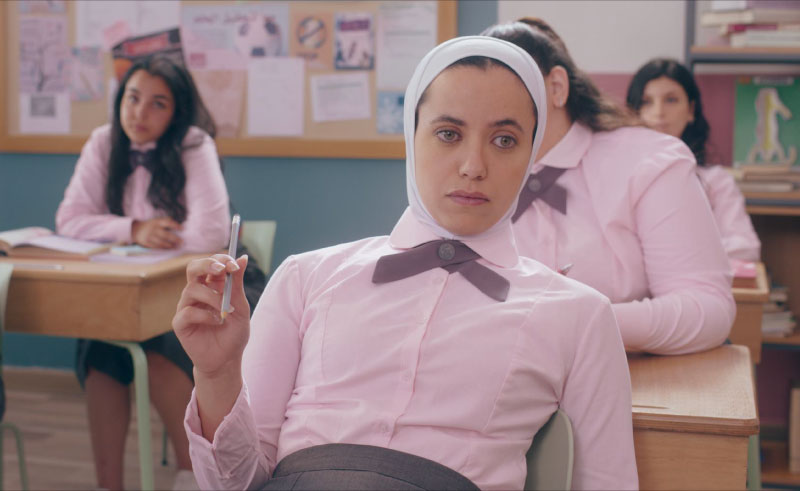 Timing in at a tight six episodes, AlRawabi avoids the pitfall of Arab series’ stuffing side-plots and tangent characters to increase runtime. The only time it does drag is the midpoint, in episode three. At the school’s open day, Layan and Rania meet their respective boyfriends, leaving Ruqqaya, the fifth wheel and Mariam’s first target, vulnerable to a plan to get into her heart, and her phone.
Timing in at a tight six episodes, AlRawabi avoids the pitfall of Arab series’ stuffing side-plots and tangent characters to increase runtime. The only time it does drag is the midpoint, in episode three. At the school’s open day, Layan and Rania meet their respective boyfriends, leaving Ruqqaya, the fifth wheel and Mariam’s first target, vulnerable to a plan to get into her heart, and her phone.
Mariam, Noaf, and Dina catfish Ruqqaya, who wears a veil, on Facebook, convincing her they’re a guy who’s falling in love with her, and seducing her into sending them a selfie without her veil on. They post the selfie on her profile, which they’ve hacked into. Ruqqaya - facing the worst of Jordanian social media comments and the rage of her overbearing conservative mother - is mortified, pulled out of school, and accused of ruining the family’s reputation and her sisters’ chances of getting married.
The Ruqqaya takedown reveals a few things about Mariam’s revenge plot. Firstly, not all of her plans make sense. Some are smart, with perfectly proportional consequences, like broadcasting Layan’s voice-notes and getting her clique sentenced to demeaning community service. Others, like the Ruqqaya plan, seem a little thin. They posted her photo without a veil, which only took a few minutes for Ruqqaya to see. Could she not have deleted it and said she posted it to her public page by accident? Even if the girls still have access to her account, could she not have at least tried?
It’s also the first example of what Mariam’s revenge plot really is. To get back at her bullies, Mariam flicks the most obvious trigger: patriarchal violence. In doing so, she locks herself and everyone around her into a cycle that can spare none of them, into the cogs of a system that is in itself the problem.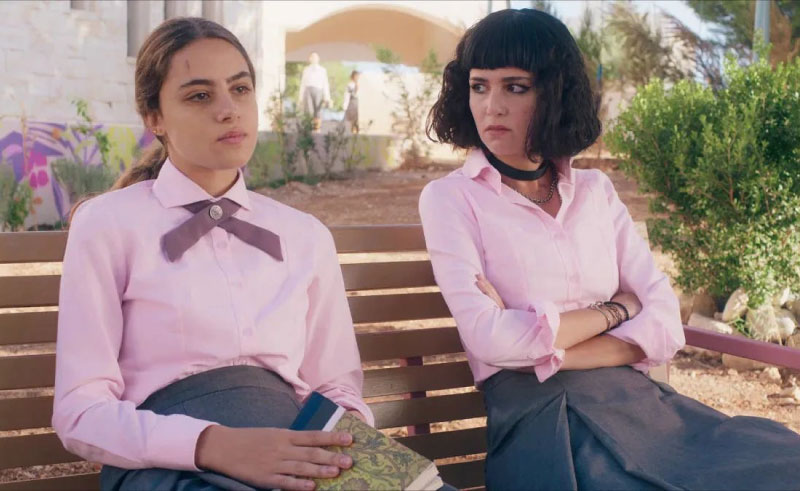 Ruqqaya is catfished into becoming ‘damaged goods’, as her mother calls her. Rania is given a black eye by her alcoholic father when Mariam gets her busted for sneaking out with her boyfriend past curfew on a school trip. And catastrophically, in the shocking finale that has had social media abuzz since it was released, Layan seems to have been shot by her chauvinistic older brother, after Mariam sends him the location of where Layan is meeting her boyfriend in secret.
Ruqqaya is catfished into becoming ‘damaged goods’, as her mother calls her. Rania is given a black eye by her alcoholic father when Mariam gets her busted for sneaking out with her boyfriend past curfew on a school trip. And catastrophically, in the shocking finale that has had social media abuzz since it was released, Layan seems to have been shot by her chauvinistic older brother, after Mariam sends him the location of where Layan is meeting her boyfriend in secret.
It’s an abrupt ending, but one that was foreshadowed perfectly. From the beginning there floats a spectre of ‘Layan’s brothers’. In one scene, she puts on a jacket over her sleeveless top because she hears one of them coming home. In another, she jumps in fright when her younger brother bursts into her room while she’s on the phone with her boyfriend, who she has saved on her phone as ‘Rania’. When she emerges from the bathroom in a third, lips and eyebrows red where she was threading her facial hair, she stutters and falters in front of her older brother, who points in accusation. It’s safe to assume he doesn’t think she’s allowed such vanities, and the scene is the smallest that the larger-than-life Layan ever is.
By the ending scene, she is weeping, terrified as her eyes go from her brother’s face to his finger on the trigger. In that moment, the unbearable weight of context is pulled in to collapse AlRawabi: the harrowing reality of honour killings in Jordan. The camera pans out of the boyfriend’s bachelor pad, onto the drying rack where Layan’s uniform is laid, a single gunshot rings out, a few birds fly away, and - though we don’t see it, which has made some question the creators’ meaning - we can assume the worst has occurred.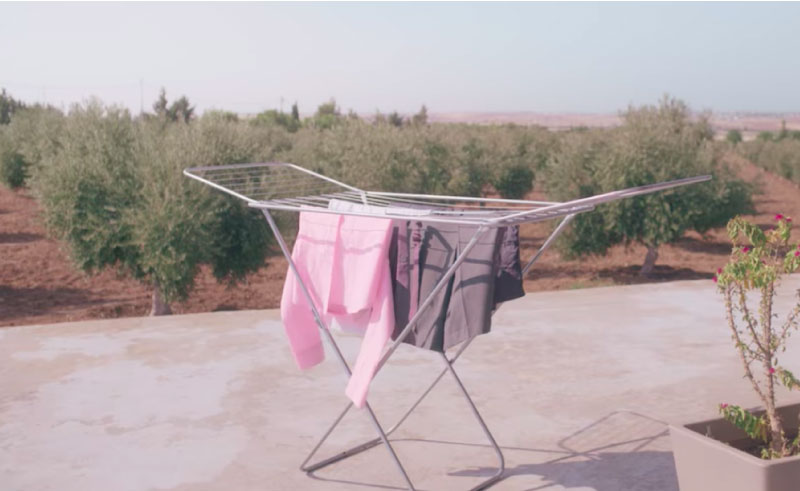 Meanwhile, back at the school, Rania, Dina, and Noaf are hunched up in a corner, terrified for Layan and what could have happened when an unflinching Mariam clicked ‘send,’ delivering the murderous brother to the scene. Mariam, head high, walks through the school, hair pinned back into a hairstyle very different from her own, mirroring Layan’s instead.
Meanwhile, back at the school, Rania, Dina, and Noaf are hunched up in a corner, terrified for Layan and what could have happened when an unflinching Mariam clicked ‘send,’ delivering the murderous brother to the scene. Mariam, head high, walks through the school, hair pinned back into a hairstyle very different from her own, mirroring Layan’s instead.
It’s not totally clear what the show is trying to say. In unleashing the worst of patriarchal violence against Layan, Mariam has unarguably gone too far. But the sight of Mariam’s own broken body - beaten and bloody and left in the dirt - is still fresh in the audience's minds, and ‘revenge is bad’ seems far too simple a takeaway for a show that’s proven itself capable of a lot more nuance.
The same strand of social media that in AlRawabi bit Ruqqaya’s head off for posting an unveiled photo is rearing its ugly head in real life. Social media comments in Jordan and the Arab world have decreed that Layan’s likely death is her just comeuppance, either for her actions against Mariam, or for sneaking off with a boy in the first place. In that sense, the show has proved its very existence.
Even with its weakest points, AlRawabi School for Girls is a powerful experience of what we can only hope Arab television is increasingly becoming: female-driven, entertaining but grounded, fresh, tightly constructed, and unapologetic.
- Previous Article HOW (NOT) TO GO TO A PING PONG SHOW
- Next Article Yazan: This Restaurant is Syrian Boy-Next-Door Personified
Trending This Week
-
Dec 16, 2025







